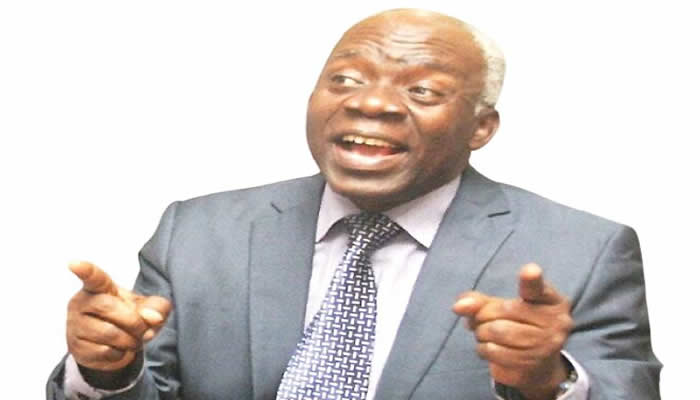Disregard for Court Judgments Threatens Nigeria’s Rule of Law: Femi Falana’s Accusation
Human rights lawyer Femi Falana has launched a scathing critique of the Nigerian government and Senate President Godswill Akpabio, accusing them of blatant disregard for court judgments and undermining the rule of law. Falana argues that this pattern of impunity, where government authorities and influential individuals flout judicial pronouncements, poses a grave threat to the very foundation of Nigeria’s legal system. He highlighted several instances of blatant disregard for court orders, painting a picture of a nation teetering on the brink of anarchy.
Falana’s primary accusation centers on the Senate’s behavior under Akpabio’s leadership. He cited the case of Comrade Tajudeen Baruwa, whose re-election as President of the National Union of Road Transport Workers (NURTW) was confirmed by both the National Industrial Court and the Court of Appeal. Despite these judicial affirmations, Baruwa was forcefully removed from office, demonstrating a flagrant disregard for the judicial process. This incident exemplifies, according to Falana, the Senate’s dismissive attitude towards court orders, setting a dangerous precedent for others to follow.
Falana also pointed to the Federal Government’s defiance of a Supreme Court ruling on local government autonomy. The Supreme Court, in a landmark decision, upheld the autonomy of local governments and directed the direct payment of statutory allocations to these entities. However, the Federal Government has allegedly ignored this judgment, further eroding the principle of judicial supremacy. This disregard, Falana argues, not only undermines the authority of the courts but also deprives local governments of the necessary resources to effectively serve their constituents.
The Senate’s treatment of Senator Natasha Akpoti-Uduaghan also drew Falana’s ire. After the Federal High Court deemed her six-month suspension illegal, the Senate not only ignored the order for her reinstatement but also escalated the suspension to an indefinite one. This action, Falana contends, demonstrates a complete disregard for the judiciary and an abuse of legislative power. The blatant disregard for court orders, Falana insists, is a clear violation of Section 287 of the Constitution, which mandates compliance with judicial pronouncements.
In response to this perceived erosion of the rule of law, Falana called on President Bola Tinubu to take decisive action. He urged the President to interrupt his vacation and address the escalating crisis, warning that the nation was descending into anarchy. He further emphasized the role of the Nigerian Bar Association (NBA) in upholding the rule of law, urging the organization to take a tougher stance against the disregard for court orders. He referenced the NBA’s historical precedent of court boycotts during the military regime of Ibrahim Babangida, arguing that the current situation demands a similar level of assertive action to defend the judiciary.
Falana expressed deep concern that the Fourth Republic, already grappling with issues of corruption and abuse of power, was on a path to collapse due to the increasing disregard for the rule of law. He lamented that election riggers now operate with brazen confidence, challenging aggrieved parties to seek redress in courts where the outcomes seem predictable. This, he argued, signals a dangerous trend where the integrity of the electoral process is undermined, and faith in the judiciary is eroded.
Falana’s powerful indictment of the government and the Senate serves as a stark reminder of the fragility of democratic institutions. His call for action emphasizes the urgent need for respect for the rule of law, where judicial pronouncements are upheld, and the integrity of the legal system is preserved as the cornerstone of a functioning democracy. His warning of impending anarchy underscores the need for immediate intervention by all stakeholders to prevent the further erosion of Nigeria’s democratic foundations. The disregard for court orders, as highlighted by Falana, is not simply a legal issue but a fundamental challenge to the very fabric of Nigerian society, one that threatens the stability and progress of the nation.














